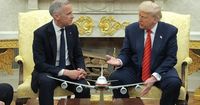Prime Minister Mark Carney is set to meet with Canada’s premiers on June 2, 2025, in Saskatoon, amid rising tensions with western provinces, particularly Alberta. The meeting comes shortly after Carney's recent election victory and a high-profile meeting with U.S. President Donald Trump, where trade issues dominated discussions.
In a social media post, Carney expressed that in light of "immediate trade pressures," his focus, along with the premiers, is on enhancing Canada’s economic resilience. "That means launching big nation-building projects, removing internal trade barriers, and building one Canadian economy," he wrote, emphasizing the importance of unity among provinces.
Ontario Premier Doug Ford, who participated in a conference call with Carney and other premiers on May 7, 2025, described the upcoming meeting as an "olive branch" to the West, suggesting it signifies a shift towards better relations. Ford noted that western provinces feel they have been treated poorly in the past and expressed optimism that Carney understands the need to "show some love" to Saskatchewan and Alberta.
The meeting comes at a time when Alberta Premier Danielle Smith has publicly raised the prospect of her province separating from Canada. Although Smith has stated that she personally does not support separation, her government introduced legislation aimed at reducing the threshold for triggering a provincial referendum. This move has sparked significant debate among provincial leaders.
During the conference call, Ford remarked on the need for unity, stating, "I always say, united we stand and divided we fall. That was my message today." He reiterated that now is the time for Carney to demonstrate commitment to western provinces by diversifying trade routes and enhancing infrastructure.
In addition to addressing potential separation sentiments, the premiers discussed breaking down interprovincial trade barriers. Carney has pledged to table legislation by July 1, 2025, aimed at allowing goods to move freely across the country. Ford expressed his desire for the premiers to collaborate on memorandums of understanding to expedite this process.
Carney's meeting with Trump on May 6, 2025, lasted about two hours and included discussions on the ongoing trade war and tariffs affecting Canadian exports. Following the meeting, Ford commended Carney for his restraint during discussions with Trump, highlighting the positive reception of the meeting among the premiers. "I don't think I'd have the restraint that he had yesterday, to be very frank," Ford remarked.
Manitoba Premier Wab Kinew also reached out to Carney on May 7, proposing a federal-provincial partnership on several "nation-building" projects. Kinew's letter included suggestions for creating a trade corridor through the Port of Churchill and developing critical minerals infrastructure. He emphasized that Manitoba is ready to work collaboratively to strengthen the nation.
British Columbia Premier David Eby echoed sentiments against the idea of separation, stating that it is a "non-starter" in his province. He urged other premiers to work together to combat any separatist movements and to support national unity. Eby expressed gratitude for the tone set by Carney during his interactions with the U.S. President and emphasized the importance of standing together as a country.
Carney and Trump agreed to continue discussions in the coming weeks, with a follow-up meeting planned when Carney hosts the G7 leaders' summit in Alberta from June 15 to 17, 2025. Carney remarked, "Today marked the end of the beginning of a process of the United States and Canada redefining that relationship of working together." He stressed the need for cooperation to build a robust economic and security relationship based on mutual respect.
Experts suggest that Carney faces a dual challenge in managing negotiations with the U.S., particularly regarding the Canada-U.S.-Mexico trade agreement (CUSMA), which is scheduled for review in 2026. However, Trump has indicated a desire to reopen negotiations sooner. Fen Hampson, a professor at Carleton University, noted that the immediate priority is to persuade Washington to lift tariffs on Canadian exports, which have been detrimental to trade.
Hampson commented on the precarious situation, stating, "You can't be renegotiating (a trade deal) when essentially the Americans have broken the back of the agreement with these very punitive tariffs." He pointed out that the American economy is facing challenges due to tariffs imposed on various countries, including Canada, which could work in Canada's favor during negotiations.
As Carney prepares to announce a new cabinet next week, experts suggest he will need to select individuals who possess strong negotiating skills to navigate the complex landscape of Canadian-U.S. relations. Hampson emphasized the importance of appointing tough negotiators who can effectively advocate for Canada's interests.
The upcoming meeting in Saskatoon is poised to be a pivotal moment for Carney as he seeks to unify the provinces and address the pressing trade challenges facing Canada. With the backdrop of rising separatist sentiment in Alberta and the need for cooperation among provinces, the meeting will be closely watched by both political leaders and citizens alike.
As Canada stands at a crossroads, the actions taken by Carney and the premiers in the coming weeks will be crucial in shaping the nation's future and ensuring a cohesive approach to the challenges ahead.




